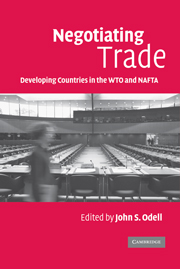1 - Introduction
Published online by Cambridge University Press: 22 September 2009
Summary
Negotiating international trade agreements has become a full-time job for developing countries. They negotiate often in pairs, in regional groups, and as members of the World Trade Organization (WTO), where they make up the majority of members. The WTO in particular is one of the premier sites where globalization will be either managed or mismanaged. Some official talks aim for deals that shape international rules and state policies. Other talks seek settlements for legal disputes arising in the shadow of those rules. Ultimately all this bargaining helps determine who receives the gains and bears the burdens of trade, with powerful consequences for local communities across the globe.
Less developed countries have become dramatically more active in trade negotiations in recent years, as their policies and societies have become more dependent on trade. Even the smallest traders are better organized and prepared than in the past. They were prominent players in WTO ministerial conferences in Seattle in 1999, Doha in 2001, and Cancún in 2003. The results – for the entire world – depend more than ever on how developing countries negotiate.
Yet social science still does not understand the process of trade negotiation – as distinct from the institutions, laws, and economics of the issues – well enough. In particular, negotiation process research has underrepresented the experience and needs of developing countries, where the large majority of the world's people live. Empirically grounded research on their negotiations is still in its infancy.
- Type
- Chapter
- Information
- Negotiating TradeDeveloping Countries in the WTO and NAFTA, pp. 1 - 38Publisher: Cambridge University PressPrint publication year: 2006
- 8
- Cited by

